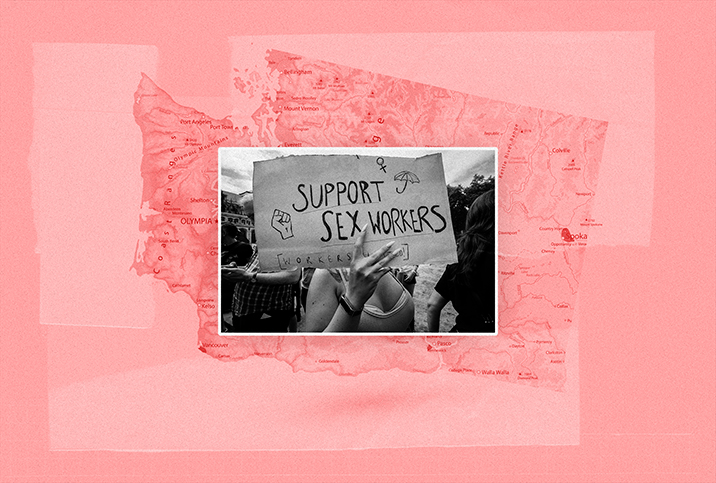Why It's Still So Hard to Get Legal Protections for Sex Workers

No one claimed it was easy being a sex worker. But few of them likely expected it would remain so difficult for so long.
The cliché reads that sex work is the oldest career in history. While the statement may not be quite true, historical records do indicate sex work dates back to 2400 B.C. in ancient Mesopotamia. One truth is clear: Then and now, sex work isn't going anywhere. How society and government treat sex workers and choose to (or choose not to) protect them has critical implications for people in the industry. You might be surprised to learn how little the laws concerning sex work have changed, even in recent years.
Miss Grey, a professional dominatrix with 15 years of experience based in the San Francisco Bay area, explained there are many different kinds of sex work, from exotic dancers, on-camera service and workers who offer full-body massages with sexual gratification. Many workers who fall under this vague umbrella, however, are in a largely legally ambiguous zone or perform acts that are vulnerable to prosecution. (One myth: that brothels are entirely legal in Nevada. It actually depends on local county or city ordinances.)
Grey is college-educated, has her own "dungeon" studio for her dominatrix gig and thoroughly vets potential clients before meeting them. She considers herself "privileged" in a world in which others lack resources and must work on the street, often subjecting themselves to threats of violence and contact with law enforcement. At a time when marijuana has been made legal or decriminalized in numerous states, broad legal and cultural openness to sex work hasn't found the same path to progress.
A 'chill' on consensual sex work
The most recent major federal legislation related to sex work has proved hugely controversial. Passed through Congress and signed into law by President Trump in 2018, FOSTA-SESTA was intended to fight human trafficking. It carves out an exception to the 1996 Communications Decency Act's long-held "safe harbor" rule exempting internet platforms and providers from being held liable for users' speech or information. With FOSTA-SESTA, providers and sites can be held liable for illegal sexual content.
There are bad actors online, Grey is quick to admit, from abusive pimps who once worked through beepers and payphones to traffickers of underage girls. While activists support the mission of cracking down on these kinds of activity, some argue the law censors sex work of all kinds, including consensual and even legal encounters.
"It really put a chill on advertising [in the industry]," Grey said.
In other words, FOSTA-SESTA affected people on the margins doing no harm, just trying to make a buck in a safe way, as in interacting with a potential client at first in a nonphysical forum. In the same year FOSTA-SESTA became law, Craigslist shut down its personals section, pushing certain sex workers to more underground, dangerous areas online and offline.
'Still stigmatized more than almost any other occupation'
None of this is quite new. Sex workers have long been without what they see as secure recourse even when they're put at severe risk, and opposition to FOSTA-SESTA and other laws of its ilk have largely fallen on deaf ears in halls of power.
The fear of criminal or civil prosecution is widespread among sex workers, according to Grey. "Every woman I know who is engaged in sex work has had some sort of situation go down—either an unpleasant interaction or something bordering on the criminal or something overtly criminal up to assault and rape," Grey said.
She has experienced "inappropriate" behavior herself and noted stalking and harassment online is rampant. The rise of social media and tools that enable identifying someone via digital means add to the fear of being outed, such as to an employer.
“I think part of the problem in establishing more protections comes down to stigma," said Sarah Blithe, Ph.D., an associate professor of communication studies at the University of Nevada, Reno, and the author of "Sex and Stigma: Stories of Everyday Life in Nevada's Legal Brothels."
'I think part of the problem in establishing more protections comes down to stigma.'
In her research, Blithe discovered that many legal protections put in place in the state's brothels, such as "lockdowns" that keep workers supervised and tests for sexually transmitted infections (as well-intentioned as they may be), are actually aimed at helping the venue owners and clients. Meanwhile, sex workers themselves, many of whom reported enjoying their jobs to Blithe, are left with few guardrails specifically for them. There are exceptions in Nevada, such as condom laws and panic buttons, that sex workers use.
"Sex work is still stigmatized more than almost any other occupation or hobby," Blithe said.
Narratives about trafficking are also problematic.
"Sex trafficking is a big problem, but not in the ways that some anti-prostitution nonprofits and the media would portray," she said. "Sex work has powerful and vocal groups lobbying against it in all forms. Anti-prostitution feminists and many religious groups are joined in an unlikely friendship against sex work."
Both Grey and Blithe believe the decriminalization of sex work—similar to how marijuana has been decriminalized in New York, Connecticut and numerous other states—is a sensible goal. Others are pushing for full legalization, though Grey would rather avoid it, thinking it would bring in big money and regulation that could harm smaller players in the industry.
Decriminalization would be helpful to sex workers for getting something as basic as health insurance or having their taxes done, Blithe noted. Then there's the brutal online targeting. Grey would like to see more legal action on cyberbullying of sex workers, though so far, members of Congress seem unsure of what to do about cyberbullying, period.
Grey might be sexually dominant and living in the relatively liberal haven of the Bay Area, but she believes she might run into trouble in another location.
"I'm not convinced that I would be treated with any kind of respect or dignity if I had to report something," she said. "F--- that."


















